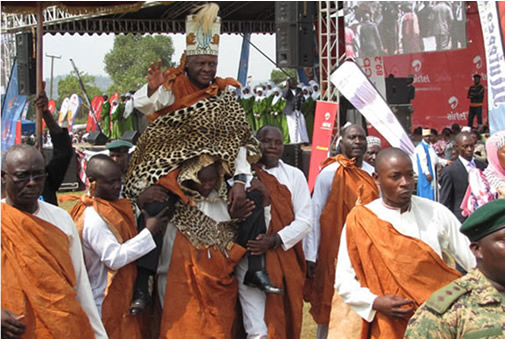 |
Omuzana ashasibwa ayamugengeire. (Haya) Mtumwa huhurumiwa na tajiri wake. (Swahili) C’est le roi qui pense à son esclave. (French) It is the master (king) who minds about his or her slave. (English) |
Haya (Tanzania) Proverb
Background, Meaning And Everyday Use
The Haya, also called Wahaya, Ziba, or Waziba, are an ethnic and linguistic group living in the Bukoba, Muleba, and Karagwe Districts of Kagera Region in northwestern Tanzania. They speak a Bantu language called Haya. In 2016 the Haya population was estimated to number 1,940,000.
Two main ethnic groups exist in the population—the pastoral Hima, who are probably descendants of wandering Nilotes, and the more agricultural Iru, descendants of the original Bantu. The Haya were traditionally organized in a series of 130 or so patrilineal clans, each having its own totem. They were formerly divided among eight small states, each under a ruler called the mukama. Traditionally, rulers appointed subordinate chiefs and officials from both royal and commoner clans. The Iru are agriculturists, whereas the Hima subsist almost entirely on the products of their herds. The Haya fish extensively. The Haya traditionally live in a dwelling, peculiar to this region, of beehive shape without walls, thatched from the point of the roof to the ground.
In the Haya Palace, there were servants who worked for the mukama or king. The king did everything he pleased with them because they were his slaves. However, he not only had control over them, but he also loved and cared for them. The proverb was used to show how and why the king cared for them.
A similar Haya Proverb is omuzana amanywa mukama we (the servant is known by his or her master).
Biblical Parallels
 Psalm 139:16: “You saw me before I was born. Every day of my life was recorded in your book. Every moment was laid out before a single day had passed.”
Psalm 139:16: “You saw me before I was born. Every day of my life was recorded in your book. Every moment was laid out before a single day had passed.”
Isaiah 49:15: “Can a woman forget her own baby and not love the child she bore? Even if a mother should forget her child, I will never forget you.”
John 10:11: “I am the good shepherd. The good shepherd lays down his or her life for the sheep.”
2 Peter 1:10: “Therefore, my brothers and sisters, make every effort to confirm your calling and election. For if you do these things, you will never fall.”
Contemporary Use And Religious Application
As Christians, we believe in God’s Divine Providence. God takes care of us more than how the earthly kings do. The Haya people honored and respected their king. The people who worked in the palace knew that they were privileged to serve the king.
But what is God’s call for us? Are we happy to stay in God’s palace, in God’s kingdom? Yes we are because God never abandons us. He is the true master who minds about his slaves, his people. God takes care of all people, everywhere. Let us be more conscious of God’s presence in our lives.
Sister Rita Ishengoma, STH
St. Theresa of the Child Jesus Sisters
Dar es Salaam, Tanzania
Cellphone: 075-5551735
Email: srkoku@hotmail.com
srkoku@gmail.com
Ben Mabuto, Editor
Photographs provided by:
Elias Bushiri Elie
Nairobi Kenya
Cellphone: +254 735 973 276
+254 792 556 909
Email: ebushiri@gmail.com
e.bushiri@yahoo.com

